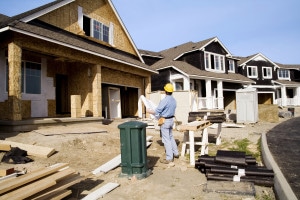The blame for Greater Boston’s never-ending housing crisis, which has jacked up sale prices and rents to obscene levels, can’t be blamed on any one city or town. Decades of onerous zoning policies and NIMBY attitudes have left buyers tearing out their hair in a market starved for new homes and new listings.
But when it comes to building the new homes, apartments and condominiums that we badly need to get the Boston area out of this mess, there’s a big problem looming that threatens to keep home prices and rents artificially high for years to come.
Looking at the latest building permit numbers for Boston and the suburbs, it’s pretty clear that Boston and the region’s urban core is pulling well above its weight when it comes to new housing construction, while the suburbs are once again slacking off. Figures are from the U.S. Census Bureau, the city of Boston and the Boston Foundation’s annual report on the housing market.
Boston and its urban neighbors – Cambridge, Somerville, Revere, Chelsea and Winthrop – account for 22 percent of Greater Boston’s population.
Yet 36 percent of all the new apartments, homes and condos built in 2013 in Greater Boston – defined roughly as Eastern Massachusetts minus the Cape and Fall River/New Bedford – took place in the urban core.
That number dipped to a still high 33 percent in 2014, before jumping to nearly half – or 47 percent – in 2015.
The full 2016 numbers aren’t in yet, but even with what appears to be temporary drop in new housing starts in Boston, the city is still punching well above its weight.
Boston proper accounts for just 15 percent of metro Boston’s population – or just under 646,000 of the region’s population of 4.2 million.
But even in a slower year – relatively speaking – like 2016, Boston issued 2,862 permits for new housing, or 22 percent of the region’s total. And 2017 appears poised to be another banner year, with city recording more than a 1,000 new housing starts during the first three months of the year.
Sense a trend here?
City Vs. Suburbs
Sure, city living has become much more popular in the past two decades, but there’s much more than that going on here.
Boston Mayor Marty Walsh has made the construction of tens of thousands of new units of housing a top priority with his Boston 2030 plan. He’s building upon the strong legacy of his predecessor, the late, great Thomas M. Menino, who pushed hard for two decades on the housing front.
Even Cambridge, which has had its share of memorable NIMBY moments over the years, has stepped up, issuing permits for roughly 1,800 new condos and apartments between 2013 and 2015, not bad for a city a sixth of the size of Boston.
But in the suburbs, it’s a much different story. In the few cases where there has been actual leadership on the housing issue by suburban pols, it has been in a negative direction, pushing back against efforts by developers to build new apartment projects, especially if they include a few subsidized, affordable units.
Newton Mayor Setti Warren is a prime example, trying to position himself as champion of efforts to build more affordably priced housing even as he seeks a loophole that would exempt the Garden City from the requirements of Chapter 40B, the state’s affordable housing law.
He’s not alone, with other local communities trying the same ploy.
Once again, the results can be seen the stats.
With a population of 1.5 million, Middlesex County, which includes Newton and other upscale suburbs like Weston, is home to nearly three times as many people as Boston.
But the suburbs, small cities and towns that dot the western suburbs only managed to permit 4,315 new homes, condos and apartments in 2015 – just a couple hundred permits more than Boston issued that year.
Or, for that matter, just take Essex County, made up of the suburbs on the North Shore and Merrimack Valley, and Norfolk County, which stretches from uber-wealthy Brookline and Wellesley on down through prosperous towns on the I-95 corridor like Medfield, Walpole and Foxborough.
Both counties have populations comparable to that of Boston itself. Yet while Boston issued 4,161 housing permits in 2015, the suburbs in Essex and Norfolk County only managed a measly 734 and 1,284 housing starts, respectively.
Frankly, there’s not much more Boston can do to accelerate housing construction in the city, which, in downtown at least, is already densely built out. It’s time for the suburbs to step up and do their fair share.
However, given the decades local selectmen and other officials have spent trying to wall off their towns from new housing of any sort with NIMBY zoning restrictions, I am definitely not holding my breath.









